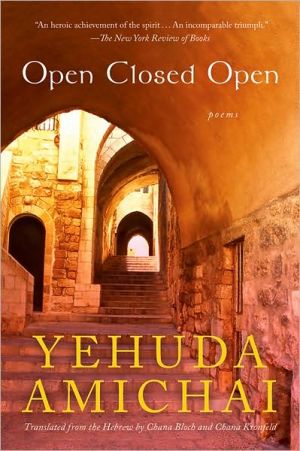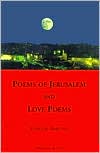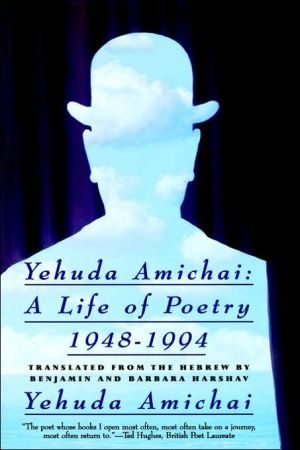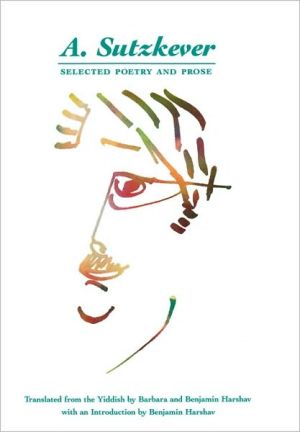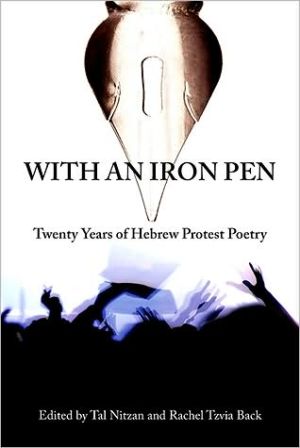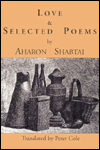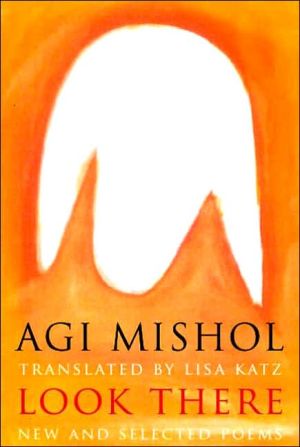Open Closed Open: Poems
In poems marked by tenderness and mischief, humanity and humor, Yehuda Amichai breaks open the grand diction of revered Jewish verses and casts the light of his own experience upon them. Here he tells of history, a nation, the self, love, and resurrection. Amichai’s last volume is one of meditation and hope, and stands as a testament to one of Israel’s greatest poets.\ \ Open closed open. Before we are born, everything is open\ in the universe without us. For as long as we live,...
Search in google:
Amichai writes of the language of love, and tea with roasted almonds, of desire and love. Of a Jewish cemetery whose groundskeeper is an expert on flowers and seasons of the year, but no expert on buried Jews; of Russian shirts embroidered in the colors of love and death; of Jerusalem, the city where everything sails: the flags, the prayer shawls, the caftans, the monks' robes, the kaffiyehs, and young women's dresses. The poet tenderly, mischievously, breaks open the grand diction of the revered Jewish verses and supplications and suddenly discovers the light that his own experience casts upon them. Here, the bread of memory and the circuses of forgetting, nostalgia for God and a better world, dust and heat, and tamarisk trees that stand as flight attendants for the next millennium, saying, "You can still get a seat on the third millennium before liftoff." Open Closed Open-poems at once meditative and playful, anxious and full of hope, sung in a language of biblical directness and meaning, that through the microcosm of the everyday give us the gift of the world at large. About the Author:Yehuda Amichai was born in 1924 in Germany and emigrated to Palestine in 1936. His work has been translated into thirty-four languages.Virginia Quarterly Review...places Amichai on the verge of a new religion - this collection its song of songs, our first sacred text for the new millennium.
I Wasn’t One of the Six Million:\ And What Is My Life Span?\ Open Closed Open\ 1\ My life is the gardener of my body. The brain—a hothouse closed tight with its flowers and plants, alien and odd in their sensitivity, their terror of becoming extinct.\ The face—a formal French garden of symmetrical contours and circular paths of marble with statues and places to rest,\ places to touch and smell, to look out from, to lose yourself in a green maze, and Keep Off and Don’t Pick the Flowers.\ The upper body above the navel—an English park pretending to be free, no angles, no paving stones, naturelike,\ humanlike, in our image, after our likeness,\ its arms linking up with the big night all around.\ And my lower body, beneath the navel—sometimes a nature preserve,\ wild, frightening, amazing, an unpreserved preserve,\ and sometimes a Japanese garden, concentrated, full of forethought. And the penis and testes are smooth polished stones with dark vegetation between them,\ precise paths fraught with meaning and calm reflection. And the teachings of my father and the commandments of my mother are birds of chirp and song. And the woman I love is seasons and changing weather, and the children at play are my children. And the life my life.\ 2\ I’ve never been in those places where I’ve never been and never will be, I have no share in the infinity of light-years and dark-years,\ but the darkness is mine, and the light, and my time is my own. The sand on the seashore—those infinite grains are the same sand where I made love in Achziv and Caesarea.\ The years of my life I have broken into hours, and the hours into minutes and seconds and fractions of seconds. These, only these,\ are the stars above me that cannot be numbered.\ 3\ And what is my life span? I’m like a man gone out of Egypt:\ the Red Sea parts, I cross on dry land,\ two walls of water, on my right hand and on my left.\ Pharaoh’s army and his horsemen behind me. Before me the desert,\ perhaps the Promised Land, too. That is my life span.\ 4\ Open closed open. Before we are born, everything is open in the universe without us. For as long as we live, everything is closed within us. And when we die, everything is open again.\ Open closed open. That’s all we are.\ 5\ What then is my life span? Like shooting a self-portrait.\ I set up the camera a few feet away on something stable\ (the one thing that’s stable in this world),\ I decide on a good place to stand, near a tree,\ run back to the camera, press the timer,\ run back again to that place near the tree,\ and I hear the ticking of time, the whirring like a distant prayer, the click of the shutter like an execution.\ That is my life span. God develops the picture in His big darkroom. And here is the picture:\ white hair on my head, eyes tired and heavy,\ eyebrows black, like the charred lintels above the windows in a house that burned down.\ My life span is over.\ 6\ I wasn’t one of the six million who died in the Shoah,\ I wasn’t even among the survivors.\ And I wasn’t one of the six hundred thousand who went out of Egypt.\ I came to the Promised Land by sea.\ No, I was not in that number, though I still have the fire and the smoke within me, pillars of fire and pillars of smoke that guide me by night and by day. I still have inside me the mad search for emergency exits, for soft places, for the nakedness of the land, for the escape into weakness and hope,\ I still have within me the lust to search for living water with quiet talk to the rock or with frenzied blows.\ Afterwards, silence: no questions, no answers.\ Jewish history and world history grind me between them like two grindstones, sometimes to a powder. And the solar year and the lunar year get ahead of each other or fall behind,\ leaping, they set my life in perpetual motion.\ Sometimes I fall into the gap between them to hide,\ or to sink all the way down.\ 7\ I believe with perfect faith that at this very moment millions of human beings are standing at crossroads and intersections, in jungles and deserts,\ showing each other where to turn, what the right way is,\ which direction. They explain exactly where to go,\ what is the quickest way to get there, when to stop and ask again. There, over there. The second turnoff, not the first, and from there left or right,\ near the white house, by the oak tree.\ They explain with excited voices, with a wave of the hand and a nod of the head: There, over there, not that there, the other there,\ as in some ancient rite. This too is a new religion.\ I believe with perfect faith that at this very moment.\ \ Compilation copyright © 2000 by Yehuda Amichai Copyright © 2000 by Chana Bloch and Chana Kronfeld All rights reserved. No part of this publication may be reproduced or transmitted in any form or by any means, electronic or mechanical,\ including photocopy, recording, or any information storage and retrieval system, without permission in writing from the publisher.\ Requests for permission to make copies of any part of the work should be submitted online at www.harcourt.com/contact or mailed to the following address: Permissions Department, Harcourt, Inc.,\ 6277 Sea Harbor Drive, Orlando, Florida 32887-6777.
CONTENTS The Amen Stone \ I Wasn’t One of the Six Million:\ And What Is My Life Span? Open Closed Open \ I Foretell the Days of Yore \ The Bible and You, the Bible and You, and Other Midrashim \ Once I Wrote Now and in Other Days:\ Thus Glory Passes, Thus Pass the Psalms \ Gods Change, Prayers Are Here to Stay \ David, King of Israel, Is Alive: Thou Art the Man \ My Parents’ Lodging Place \ What Has Always Been \ Israeli Travel: Otherness Is All, Otherness Is Love \ Evening Promenade on Valley of the Ghosts Street \ Summer and the Far End of Prophecy \ Houses (Plural); Love (Singular) \ The Language of Love and Tea with Roasted Almonds \ The Precision of Pain and the Blurriness of Joy:\ The Touch of Longing Is Everywhere \ In My Life, on My Life \ Jewish Travel: Change Is God and Death Is His Prophet \ Names, Names, in Other Days and in Our Time \ Jerusalem, Jerusalem, Why Jerusalem? \ Conferences, Conferences: Malignant Words, Benign Speech \ My Son Was Drafted \ Autumn, Love, Commercials \ And Who Will Remember the Rememberers? \ The Jewish Time Bomb \ Notes Acknowledgments
\ From Barnes & NobleAn Open Question \ The big issues frighten and fascinate Israeli poet Yehuda Amichai. War, peace, love, and haunting, unanswerable questions are the commodities he trades in, and that grand mentality is one reason why his moving poems have broad international appeal.\ For decades, the widely translated Amichai has written short, memorable poems full of double meanings, Biblical references, and the sharp pain of living with an ancient religious tradition in a modern political landscape. And of course, there have been dozens of love poems to women -- and to the poet's home city of Jerusalem.\ Open Closed Open, a new translation from Hebrew into English of what many critics are calling Amichai's magnum opus, reveals a book that is strikingly different in structure from his previous collections. This ambitious collection, translated by Chana Bloch and Chana Kronfeld, is divided into chapters which each contain a single long poem, broken into many small parts.\ The book's ambition is also evident in its subject matter. Instead of focusing on an individual moment between a man and a woman, or one isolated thought, as many of his earlier poems did, these large poems tackle life itself in almost every stanza. This is the work of a mature poet who now feels comfortable writing openly about immortality. Early in the book, the explanation for the title appears:\ Open closed open. Before we are born, everything is open\ in the universe without us. For as long as we live, everything is closed\ within us. And when we die, everything is open again.\ Open closed open. That's all we are.\ \ These lines, like so much of this book, are deeply rooted in Jewish tradition. Here, the poet alludes to a frequently uttered prayer which thanks God for keeping the openings of the body open, because that is what allows life to continue. Of course, the cyclical tone is reminiscent of Ecclesiastes, and the repetition of phrases is prayerlike.\ The "open closed open" theme returns in the book's closing chapter, titled "And Who Will Remember the Rememberers?" This passage starts off in typical Amichai style, with a mundane detail that then veers into a profound thought:\ Have I mentioned that my father, in the wisdom of his hands,\ knew how to prepare parcels for transport,\ packed tight and sealed tight\ so they wouldn't come undone along the way like me?\ \ Then Amichai addresses what "transport" usually refers to in Jewish history books:\ So much death in everything, so much packing and transport,\ so much open that will never close again, so much closed\ that will never open.\ \ The question of who will remember the "so much closed that will never open" plagues Amichai throughout the book. Another huge, haunting presence is the issue of faith and doubt. Raised in an Orthodox Jewish home, the poet has lived most of his life as a secular man. Many of his previous poems touched on how modern events challenge faith.\ Here, Amichai writes -- rather surprisingly -- that looking back, he realizes that he has been faithful in his own way. In the book's opening poem, "And What Is My Lifespan? Open Closed Open," Amichai takes the phrase "I believe with perfect faith," which in Jewish liturgy is followed by the phrase "the coming of the Messiah," and gives his own view of what he has come to believe:\ I believe with perfect faith that at this very moment,\ millions of human beings are standing at crossroads\ and intersections, in jungles and deserts,\ showing each other where to turn, what the right way is,\ which direction. They explain exactly where to go,\ what is the quickest way to get there, when to stop\ and ask again. There, over there. The second\ turn-off, not the first, and from there left or right,\ near the white house, right by the oak tree.\ They explain with excited voices, with a wave of the hand\ and a nod of the head: There, over there, no not there, there,\ as in some ancient rite. This too is a new religion.\ I believe with perfect faith that at this very moment.\ \ That's just one of the book's many attempts at describing what the poet believes. In the second long poem-chapter, titled "I Foretell the Days of Yore," Amichai tries again. He doesn't depict himself as a rebel who has not kept the major tenets of the Jewish faith, which is what he did in previous volumes. In this mature book, he repeatedly calls himself a believer, a man observant of commandments. Here again he offers his own twist:\ Now after many years of living I begin to see\ that I rebelled only a little, and I do observe\ all the laws and commandments.\ I observe the law of gravity, that is, the law of the earth's attraction,\ with all my body and all my strength and with all my love;\ I observe the law of equilibrium and the law of the conservation of matter:\ my body and my body, my soul and my soul, my body and my soul.\ \ Amichai often expresses spiritual issues in the language of the secular world, here borrowing from the scientific vocabulary. A few lines later, he makes it even more concrete, as he describes getting to know himself, his own body and his own soul:\ I begin to understand, as I would with an old car,\ what makes it work, the action of pistons and brakes,\ reward and punishment, be fruitful and multiply,\ forget and remember, bolts and springs,\ fast and slow, and the laws of history.\ \ The Biblical injunction "be fruitful and multiply" and its constant emphasis on both reward and punishment begin to make sense for the poet as he reaches old age. Of course, in Amichai's traditional open-ended style, he uses "begin to understand." Even after all these decades of chronicling faith and doubt, lust and love, and war and peace, he knows he has only begun. At the end of the volume, as at the beginning, all those "open" questions are "open again."\ —Aviya Kushner\ \ \ \ \ \ Virginia Quarterly Review...places Amichai on the verge of a new religion - this collection its song of songs, our first sacred text for the new millennium.\ \ \ Jonathan WilsonAmichai's poems are easy on the surface and yet profound: humorous, ironic and yet full of passion, secular but God-engaged, allusive but accessible, charged with metaphor and yet remarkably concrete. Most of all, they are full of love . . .\ —New York Times Book Review\ \ \ \ \ Kirkus ReviewsWhen this collection was published in 1998 in Israel, it was the first volume of Amichai's verse in nearly a decade and was greeted as a magnum opus; now that it can be read in English, in an adroit translation, it is clear that the critical reception on his home turf was well merited. Given that the poet is 75, it is understandable that the tone is somewhat valedictory—but there has always been a somewhat melancholic undertone to Amichai's writing, an awareness of the gradual decay of the body and the wearing away of the spirit. More than ever, Amichai's poems are about the idea of embodied language, of the place of the body in history as the crossroads of the personal and the political: `Jewish history and world history / grind me between them like two grindstones, sometimes / to a powder,` he writes early in the volume. For much of this book, Amichai is poised between `the cycle of departure and return` and `the cycle of remembering and forgetting,` two central themes in Jewish history and belief that have run through his work since his first published poems. He plays on those themes in densely allusive and yet conversational verse, redolent of the Hebrew Bible and the Jewish prayer book. The tone, as always, is wry, sardonic, bittersweet, and even at 75 Amichai can still summon up the energy for a slice of erotic longing. A major work by one of the world's great living poets—but not, one hopes, the last word.\ \
